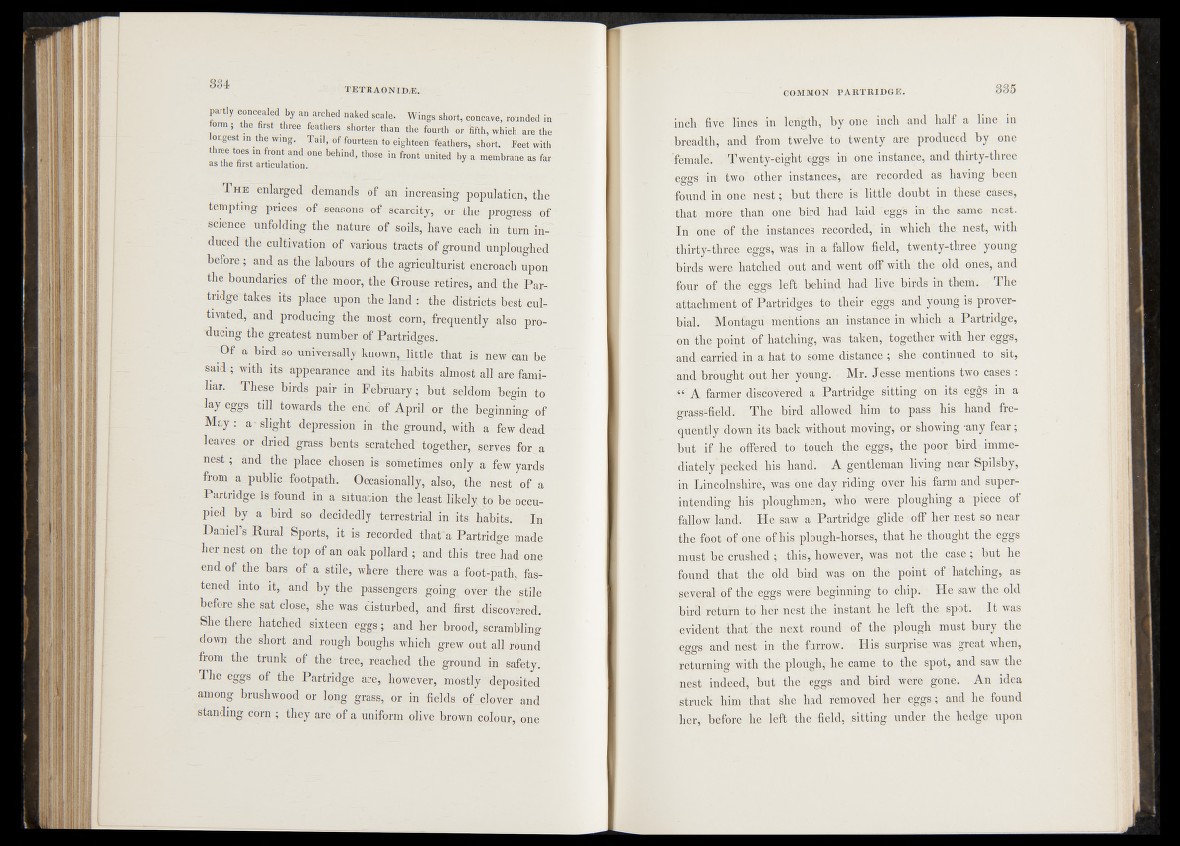
partly concealed by an arched naked scale, Wings short, concave, rounded in
orm5 the first three feathers shorter than the fourth or lifth, which are the
ongest m the wing. Tail, of fourteen fo'eighteerT’ffeathers, short! Feet with
three toes in front and one behind, those in front United by a membrane as far
as the first articulation.
T he enlarged demands of an increasing population, the
tempting prices of-seasons of scarcityAr' dhe progress of'
•; science unfolding the nature of soils,* have each -in.turn im~
duced the cultivation of wanous tracts of ground Upploughed
before; and as the labours of the ^agriculturist1' encroach upon
the boundaries of the moor, the Grouse retires, and the Partridge
takes its place upon the land : the districts?#est cultivated,
v and producing the mog£ c<uhy;fre<piently also producing
the greatest number of Partridges.
0 f a bird so universally known, Jittle that is new c a n i ^
stoi-; with its appearance and its habits ..almost, all are fami-
liar. These birdr pair in February; but seldom begin^*6/
day eggs till towards the-end of April or th^^eginning df
May : a* slight depressionTin-the ground, with a. few dead
leaves or dried grass bents scratched together,. .f e e s for a
a e st; and the-place ehosen is -sometimes only a few .yards
from a public, footpath. Occasionally, also, the- nest of a
Partridge is-found in actuation the W r iik e T y ib e cccu-
pied by a bird so decidedly terrestrial in its'habits. "In
Daniel’s Rural Sports, it is 'recorded'. thaPa Partridge made
her nest on the top of an oak'-pollard ; and this tree had one
end of the bars of a stile, where there was a footbath, fastened
into-it-P-and by the passengers goings over the-.sTile
before she sat close, she was disturbed, and first discovered1.
She there hatched sixteen eggs; and her brood, scrambling
dowu the short and. rough' boughs which grew out all round
from the trunk of the tree, reached the ground-in safety.
The eggs of the Partridge are, however, mostly "deposited
among brushwood or long grass, or in fields ofrclover and
standing corn; they are'of a uniform olive brown colour, one
inch five lines in length, by one inch and half a line in
breadth;' and from ^twelve ‘to twenty are produced by one
-female!. Twenty-eight ?eggs, in one instance, and thirty-three
es’irs i n -two'! other instances, are recorded as having been
fltand in one né§t there :is little doubt in thes^ cases,
that m ore ^than| Lone! bird' had laid I eggs in 'th e same nest.
In oi-e' idf the instanpds ^recorded,' in which ' the. nest, with
^lafrty^threeae^, > was in a fallow field^twenty-three' young
birds-^E'e;hatched;out?and went oiBP with!th#,old ones, and
four of - thfeeggs [left* behing had live_ birds in them. The
attachment ©f Partridges to th e ir and young is proter-
bial. Montagu «mentions an instance in which a. Partridge,
on the point of hatching, f#as>- tal^p, - together- with her eggs,
and carried in a: hat fo .some- distaneqg;. ■ she continued to sit,
and broughtmut hemyoungi' • Mr. Jesse mentions two cases |
!§g A* farmer discovered! a -Partridge ^sitting’on its eggs in a
fgrasSrfeld.' The bird allowed him to pass , his hand fre-
<|uen ttys d'own its back without moving, Qp showing *any fear;
libmtrtif ^-«offered■>torfüëuch the eggs, the poor bird- immediately
JSieked his hand'. A gentleman living near Spilsby,
in Lincolnshire, was due? day riding ov^|his farin' and super-
dafitending » -pl^ughmeu, who were-, ploughing a pi|ef> of
fallow. land. He sawilajh Partridge ,*glide^pff ,hèr nestgjsp near
-the footrofcêné of Kis plough-horses, that he thought the eggs
must be crushed ; .thjs^however, was not the case; but he
ifound that the old bird was .ón-Ctho* point o f ’hatching, as
geverabof the eggs were ^beginning to chip. lie saw the j|m|
bird-return td-kehmestdh.es instant’ he left'”thé. spot, It was
evident" that the -next|,round of the plough must bury the
ehffs and nest in the furrow. His surprise was! great when,
returning w-ith the. plough, he came ,td the spot, and saw the
ne'st indeed; but the eggs and bird were gone. An idea
'struclf ihim. that; ,Ae had removed hef, eggs; and he found
fheiy before he left the field, sitting under the hedge upon